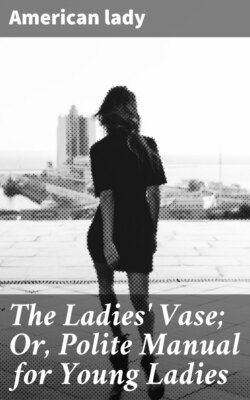Читать книгу The Ladies' Vase; Or, Polite Manual for Young Ladies - American Lady - Страница 7
На сайте Литреса книга снята с продажи.
IMPORTANCE OF GOOD MANNERS.
ОглавлениеTable of Contents
There is something in the very constitution of human nature which inclines us to form a judgment of character from manners. It is always taken for granted, unless there is decisive evidence to the contrary, that the manners are the genuine expression of the feelings. And even where such evidence exists—that is, where we have every reason to believe that the external appearance does injustice to the moral dispositions; or, on the other hand, where the heart is too favorably represented by the manners—there is still a delusion practiced upon the mind, by what passes under the eye, which it is not easy to resist. You may take two individuals of precisely the same degree of intellectual and moral worth, and let the manners of the one be bland and attractive, and those of the other distant or awkward, and you will find that the former will pass through life with far more ease and comfort than the latter; for, though good manners will never effectually conceal a bad heart, and are, in no case, any atonement for it, yet, taken in connection with amiable and virtuous dispositions, they naturally and necessarily gain upon the respect and goodwill of mankind.
You will instantly perceive—if the preceding remarks be correct—that it is not only your interest to cultivate good manners, as you hereby recommend yourself to the favorable regards of others, but also your duty, as it increases, in no small degree, your means of usefulness. It will give you access to many persons, and give you an influence over those whom you could otherwise never approach; much less, whose feelings and purposes you could never hope, in any measure, to control.
"If I should point you to the finest model of female manners which it has ever been my privilege to observe," says a late writer, in a letter to his daughter, "and one which will compare with the most perfect models of this or any other age, I should repeat a venerated name—that of Mrs. Hannah More. It was my privilege, a few years ago, to make a visit to the residence of this distinguished female; a visit which I have ever since regarded as among the happiest incidents of my life. At that time, she numbered more than fourscore years, but the vigor of her intellect was scarcely impaired; and, from what she was, I could easily conceive what she had been when her sun was at its meridian. In her person, she was rather small, but was a specimen of admirable symmetry. In her manners, she united the dignity and refinement of the court, with the most exquisite urbanity and gentleness which the female character, in its loveliest forms, ever exhibited. She impressed me continually with a sense of the high intellectual and moral qualities by which she was distinguished, but still left me as unconstrained as if I had been conversing with a beloved child. There was an air of graceful and unaffected ease; an instinctive regard to the most delicate proprieties of social intercourse; a readiness to communicate, and yet a desire to listen; the dignity of conscious merit, united with the humility of the devoted Christian: in short, there was such an assemblage of intellectual and moral excellences beaming forth in every expression, and look, and attitude, that I could scarcely conceive of a more perfect exhibition of human character. I rejoice that it is the privilege of all to know Mrs. More through her works; and I can form no better wish for you than that you may imbibe her spirit, and walk in her footsteps."
